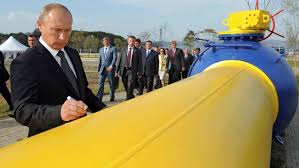After Russia’s state-controlled energy firm abruptly stopped supplying the two European nations on Wednesday, Polish and Bulgarian presidents accused Moscow of using natural gas to coerce their countries.
Following Russian President Vladimir Putin’s announcement that “unfriendly” countries would have to start paying for gas in rubles, Russia’s currency, Bulgaria, and Poland rejected.
On Wednesday, Polish Prime Minister Mateusz Morawiecki informed Poland’s parliament that he believes the action is retaliation for fresh sanctions imposed by Warsaw on Russia over the Ukraine conflict.
Morawiecki warned that the shutdown would not intimidate Poland. He claimed that thanks to years of efforts to obtain gas from other nations, the country was safe from an energy catastrophe.
The fresh penalties, which were announced on Tuesday, targeted 50 Russian oligarchs and companies, including Gazprom, the energy giant. Poland said it had received notification from Gazprom that its gas supplies would be cut off if it did not comply with the demand to pay in Russian rubles.
PGNiG, Poland’s gas company, reported gas supplies from the Yamal pipeline were cut off early Wednesday, as Gazprom had predicted.
Gazprom warned Bulgaria on Tuesday that the country’s gas supply would be cut off at the same time, but officials in Sofia confirmed Wednesday morning that gas was still arriving.
Gazprom’s suspension of gas exports to Bulgaria, according to Bulgarian Prime Minister Kiril Petkov, is “a blatant violation of their contract” and “blackmail.”
“We are not going to give up.” He added.
Russia’s move has sparked fears that additional countries would be targeted as Western countries step up their support for Ukraine, which is now in its third month of conflict.
Officials from the European Union met in an emergency meeting on Wednesday. The announcement by Gazprom, according to European Commission President Ursula von der Leyen, is “yet another attempt by Russia to use gas as a tool of blackmail.”
In Athens, the Greek government planned to convene its own emergency meeting. The government must decide whether it will comply with the demand to finish the deal in rubles when Greece’s next scheduled payment to Gazprom is due on May 25.
Greece is increasing its liquefied natural gas storage capacity and has contingency measures in place to transition several industries from gas to diesel as a backup energy source. It’s also reversing a plan to cut domestic coal production by 20% over the next two years.
Until the interruption, Russian gas accounted for roughly 45 percent of Poland’s total gas consumption. However, coal is significantly more widely used in Poland to heat homes and the power industry, with gas accounting for only about 7% of the country’s total energy mix.
Russia’s deliveries to Poland were originally set to expire later this year. For many years, Poland has attempted to acquire supplies from other countries.
The country opened its first liquefied natural gas (LNG) facility in Swinoujscie, on the Baltic Sea coast, a few years ago. This year will see the launch of a pipeline from Norway.
Bulgaria’s energy minister stated that his country will be able to meet consumers’ needs for at least a month.
“Alternative supplies are available,” Energy Minister Alexander NikolovNikolov stated. “Bulgaria believes that alternative channels and supplies will also be obtained at the EU level.”
Russia’s approach, according to Fatih Birol, the head of the Paris-based International Energy Agency, is a “weaponization of energy supply.”
Russia’s action, he said, “makes it clearer than ever that Europe needs to lessen its dependency on Russian energy as soon as possible.”

















